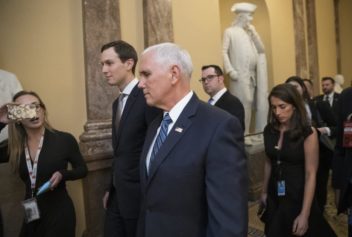
Senate Majority Leader Mitch McConnell triggered the infamous “nuclear option” Thursday, April 6.
*UPDATE: The Senate confirmed Judge Neil Gorsuch as the 133th justice of the Supreme Court Friday, April 7.
The final vote was 54-45 tally in favor of the judge’s confirmation.
ORIGINAL STORY:
Senate Republicans managed to bypass a Democratic filibuster Thursday, April 6, tossing the chamber’s long-held rules aside in order to clear a path for the confirmation of Judge Neil M. Gorsuch, President Donald Trump’s nominee to fill the vacant Supreme Court seat.
By deploying the infamous “nuclear option” of scrapping the filibuster rule for Supreme Court confirmations, GOP lawmakers essentially changed the way the Senate would typically handle such a confirmation, enabling the SCOTUS nominee to advance through the Senate with a simple majority vote of at least 51 rather than the 60-vote requirement necessary to end or limit floor debate and bring the issue to a vote. Senate members are expected to cast their final votes for Gorsuch Friday, April 7, according to NBC News.
The decision to “go nuclear” came after Senate Democrats blocked the judge’s nomination from advancing to a final vote early Thursday. The Senate then voted 55 to 45 to end the Democrats’ debate on Gorsuch — five votes shy of the majority needed — leading to the Republicans’ rule change.
“Our Democrat colleagues have done something today that is unprecedented in the history of the Senate,” said Senate Majority Leader Mitch McConnell (R-Ky.), who triggered the nuclear option. “Unfortunately, it has brought us to this point. We need to restore the norms and traditions of the Senate and get past this unprecedented partisan filibuster.”
“We will not allow their latest unprecedented act on judicial nominations to take hold,” he continued. “This will be the first, and last, partisan filibuster of a Supreme Court nomination.”
Critics of Judge Gorsuch say they’ve identified a laundry list of reasons to oppose him, from his less-than-perfect record on social justice issues to questions about his ability to act independently from the executive branch and President Trump.
“The more we learned about Judge Gorsuch’s record, the more we didn’t like,” Senate Minority Leader Chuck Schumer (D-N.Y.) said.
Republicans, however, saw Thursday’s filibuster as nothing more than payback from Dems still angry over the GOP’s refusal to consider former President Barack Obama’s SCOTUS Nominee, Merrick B. Garland, for the vacant seat left by Justice Antonin Scalia, who died on Feb. 13, 2016, with more than 11 months left in Obama’s term.
Some have expressed concern that use of the so-called nuclear option could alter the future make-up of the nation’s highest court. By requiring a simple majority to pass rather than the 60-vote threshold, more ideologically extreme candidates are likely to be elevated to a spot on the court, polarizing it even more.
“Wherever we place the starting point of this long, twilight battle over the judiciary, we are now at its end point,” Schumer said.


